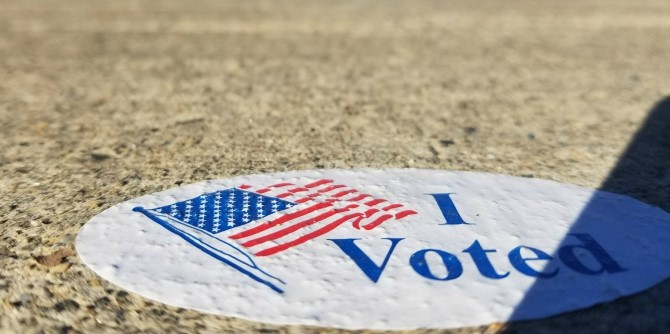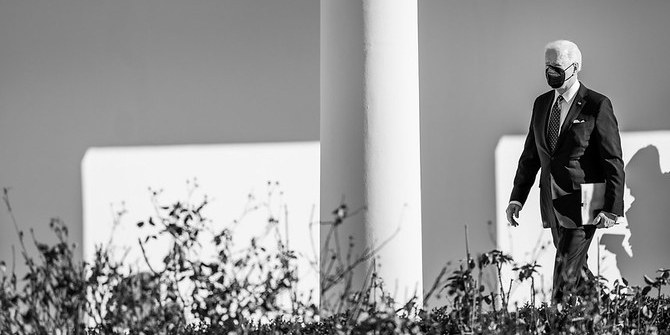 At the second presidential debate on Saturday night, Donald Trump threatened that if he became president, he would instruct his Attorney General to appoint a special prosecutor to investigate Hillary Clinton. But could Trump actually do this? Katy Harriger reviews the recent history of special prosecutors and the presidency, and writes that while Trump certainly has the ability to do so, the checks and balances of the legal system would likely limit the extent to which Clinton could be pursued. She comments that Trump’s desire to use his executive control over law enforcement to punish political rivals smacks of authoritarianism and could be very damaging for the country.
At the second presidential debate on Saturday night, Donald Trump threatened that if he became president, he would instruct his Attorney General to appoint a special prosecutor to investigate Hillary Clinton. But could Trump actually do this? Katy Harriger reviews the recent history of special prosecutors and the presidency, and writes that while Trump certainly has the ability to do so, the checks and balances of the legal system would likely limit the extent to which Clinton could be pursued. She comments that Trump’s desire to use his executive control over law enforcement to punish political rivals smacks of authoritarianism and could be very damaging for the country.
For anyone paying attention in the 1990’s, Donald Trump’s threat during the second debate to have his Attorney General appoint a special prosecutor to investigate Hillary Clinton had to feel like déjà vu all over again. And perhaps that is all Trump hoped to accomplish: to remind voters that the Clintons spent much of their time in Washington on the first go-around defending themselves against special prosecutor investigations, first about their real estate dealings with the Whitewater Corporation and then with the Paula Jones and Monica Lewinsky scandals. But the statement has raised sincere questions about whether he would actually have the constitutional authority to do this and what the democratic implications would be for this use of presidential power.
The first question centers on whether a President Trump could actually order his Attorney General to appoint a special prosecutor. The answer is yes. The Attorney General is a political appointee to the executive branch who serves at the pleasure of the President. The tension between that political reality and the fact that the Attorney General is expected to enforce federal law in an impartial way has created ongoing problems for Attorneys General throughout American history. The Watergate scandal of the 1970’s is Exhibit A for this problem.
We ended up with special prosecutors in the Watergate investigation because it was determined that the actual and apparent conflict of interest of the Department of Justice investigating the White House was just too great a challenge to public confidence in the investigation. When Nixon ordered his Attorney General Eliot Richardson to fire the first special prosecutor, Archibald Cox, Richardson resigned rather than carry out the order. So too did his Associate Attorney General. Finally, Solicitor General Robert Bork did the deed. The uproar over the “Saturday Night Massacre”, as it came to be called, led to the appointment of a second special prosecutor, Leon Jaworsky, who continued the investigation and contributed to Nixon’s decision to resign, rather than being impeached, for his role in the cover-up.

What did we learn from Watergate? Congress thought the lesson was that we needed to find a way to remove cases involving top level executive branch officials from control of the Department of Justice and to make them truly independent. The assumption was that because the Attorney General served at the pleasure of the president, the independence needed for an impartial investigation was lacking. It created a special prosecutor mechanism in the Ethics in Government Act of 1978 that required the Attorney General to request an appointment of a special prosecutor by a panel of judges if it was determined that there was sufficient credible evidence of wrongdoing to justify a continued investigation.
Twenty years and some twenty investigations later, Congress allowed the independent counsel provisions to expire in 1999. By then, both sides of the political spectrum had felt the political pain of these investigations (primarily during the Reagan and Clinton presidencies) and had decided that a special prosecutor was a treatment worse than the disease it sought to address: too easily triggered, too expensive, too unaccountable, and, ironically, too political. What that means is that we have returned to the pre-Watergate circumstances for naming special prosecutors. The president or the Attorney General decides that one is needed in a high profile criminal investigation and the Attorney General is authorized under Department of Justice regulations, to make that appointment. The answer to the first question then? Yes, Mr. Trump, were he to be elected president, could ask his Attorney General to make such an appointment, and his Attorney General, likely to be a political ally, would likely do so. Indeed, the rumored front runner for the job is New Jersey governor, Chris Christie, a former prosecutor who has already made clear at the Republican convention that he believes Mrs. Clinton is guilty of committing crimes that merit her imprisonment.
But should Mr. Trump pursue Mrs. Clinton in this way? That is a whole other question. The first thing to note is the irony that an institution designed to “remove politics” from the criminal investigation of high ranking officials is being touted in such a blatantly partisan and political way, with a conclusion already determined – lock her up! It is precisely the opposite of what special prosecutors are normally appointed to do, which is to reassure the public that an impartial investigator is looking into the matter. This kind of use of the criminal justice process – to use one’s executive control over law enforcement to punish political rivals – smacks of the politics of authoritarian dictators, not of the presidents of democratic republics.
While it may not be clear to the candidate or his supporters, it turns out we have a system of checks and balances in this country that would very likely operate to limit what a president could do in pursuing his political rivals through the criminal justice process. Before he can “lock her up,” a prosecutor’s work would be reviewed and checked by defense attorneys, judges, and juries. But the damage done to a country consumed by the political prosecution of a political rival should not be underestimated, even if the checks and balances work. The reckless throwing of this “red meat” to his followers Sunday night should be considered by all lovers of the rule of law another glaring reminder of the demagogic character of this candidate.
Featured image credit: Eli Christman (Flickr, CC-BY-2.0)
Please read our comments policy before commenting.
Note: This article gives the views of the author, and not the position of USApp– American Politics and Policy, nor of the London School of Economics.
Shortened URL for this post: http://bit.ly/2dc8PkV
______________________
 Katy J. Harriger – Wake Forest University
Katy J. Harriger – Wake Forest University
Katy J. Harriger is Professor and Chair of the Department of Politics and International Affairs at Wake Forest University. She is the author of The Special Prosecutor in American Politics, 2d ed. Revised (University of Kansas Press, 2000), the co-author with Louis Fisher of American Constitutional Law, 11th edition (Carolina Academic Press, 2016), and numerous articles on constitutional issues. She teaches courses on American politics and American Constitutional Law.






